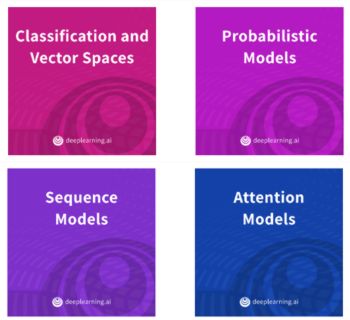| New Natural Language Processing Specialization on Coursera |
| Written by Sue Gee | |||
| Thursday, 18 June 2020 | |||
|
The first two courses of a four-course Specialization in Natural Language Processing from deeplearning.ai are now ready and waiting on the Coursera platform. This an opportunity to learn from experts in this sought-after area of AI. Disclosure: When you make a purchase having followed a link to Coursera from this article, we may earn an affiliate commission. Natural Language Processing (NLP) uses algorithms to understand and manipulate human language and is one of the most broadly applied areas of machine learning. As AI continues to expand, so will the demand for professionals skilled at building models that analyze speech and language, uncover contextual patterns, and produce insights from text and audio. The Natural Language Processing Specialization is at Intermediate level and should take around 3 months to complete at 5 hours per week. It is highly practical and in completing it you will design NLP applications that perform question-answering and sentiment analysis, create tools to translate languages and summarize text, and even build a chatbot! It comes from deeplearning.ai, a startup founded by Andrew Ng, the co-founder of Coursera, which is: on a mission to make world-class AI education accessible to people around the globe so that we can all benefit from an AI-powered future. This is the second specialization from deeplearning.ai. The first one is on Deep Learning and comprises five courses taught by Andrew Ng and we reported on it here. It is the recommended route for those who need to brush up on their working knowledge of machine learning prior to embarking on the NLP specialization. The four courses that make up the Natural Language Processing Specialization are: The courses have been designed and are taught by two experts in NLP, machine learning, and deep learning. Younes Bensouda Mourri is an Instructor of AI at Stanford University who also helped build the Deep Learning Specialization and Łukasz Kaiser who prior to joining deeplearning.ai was a Staff Research Scientist at Google Brain and is the co-author of Tensorflow and of the Tensor2Tensor and Trax libraries. In the first course, Natural Language Processing with Classification and Vector Spaces, which is estimated to require around 24 hours of effort, students will:
Then in the second course, on Probabilistic Models also requiring around 24 hours of effort, they will go tackle more tasks:
The remaining two courses, covering Sequence Models and Attention Models in NLP will continue to build the students' portfolios. By the end of this project-based specialization students will be able to: Use logistic regression, naïve Bayes, and word vectors to implement sentiment analysis, complete analogies & translate words Use dynamic programming, hidden Markov models, and word embeddings to implement autocorrect, autocomplete & identify part-of-speech tags for words Use recurrent neural networks, LSTMs, GRUs & Siamese network in TensorFlow & Trax for sentiment analysis, text generation & named entity recognition Use encoder-decoder, causal, & self-attention to machine translate complete sentences, summarize text, build chatbots & question-answering Coursera offers a 7-day free trial after which the subscription is $49 per month. Although you can audit the individual courses for free, this means you can't access the graded exercises that are such a large and central part of it.
More InformationNatural Language Specialization Deep Reinforcement Learning on Udacity Related ArticlesAndrew Ng on Advances In Deep Learning Deep Learning From Udacity and Coursera Coursera's Machine Learning Specialization To be informed about new articles on I Programmer, sign up for our weekly newsletter, subscribe to the RSS feed and follow us on Twitter, Facebook or Linkedin.
Comments
or email your comment to: comments@i-programmer.info |
|||
| Last Updated ( Tuesday, 21 June 2022 ) |





